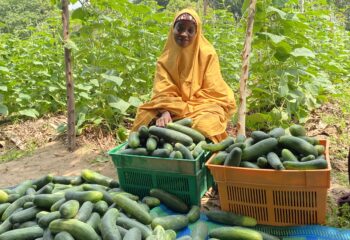
Farmers from Burundi’s Rangi Hill, Nyanza Commune, once relied heavily on the rainy season to cultivate their fields. When the Soil Fertility Stewardship Project (PAGRIS) arrived, the project and community collaborated to identify a suitable site for an irrigation dam to support cultivation even during the dry season, when fields were typically left idle.
With the project’s support, the dam was built, and once water reached their fields, farmers began launching additional agricultural projects. This initiative, which also included the installation of drinking water pipelines and water fountains, was transformative for Nyanza Commune residents.
“We’re very grateful for PAGRIS because if it hadn’t been for this irrigation initiative, we’d be wasting our time on unimportant things.”
Jules Bikorimana, Farmer and Project Partner
Local farmer Jules Bikorimana manages a 1.5 hectare tomato field, alongside a nearby plot of white eggplant. From his tomato field alone, he expects to harvest around 4 tons, which could generate approximately 10,000,000 Burundi Francs (BIF) (approximately U.S. $3,375.88), depending on market prices.

Jules expressed his gratitude to the project, saying, “We’re very grateful for PAGRIS because if it hadn’t been for this irrigation initiative, we’d be wasting our time on unimportant things.” He acknowledged PAGRIS for providing substantial financial and material support for the dam’s construction.
Jules also remarked that he used to grow cassava because it is drought-resistant; but it takes a long time to harvest. Today, thanks to the dam, ready access to water allows him greater choice in what to grow. Even during the dry season, Jules can now leave behind the more difficult cassava crop in favor of his more profitable tomatoes.
The benefits of this initiative extend beyond farmers. Olivia Niyokwizera, another resident of Nyanza Commune, visits Jules to buy tomatoes locally. She explained that in the past, she had to travel as far as Muyange (around 332 km) to find the product, which cost her 5,000 BIF (approximately U.S. $1.69) for transportation.
“Today, I bought my supplies right here, without having to pay for a ticket. It’s a real advantage for me,” Olivia said, highlighting the impact of local production made possible by PAGRIS.

Community consultation and participation played a central role in these developments. Before the dam or any drinking water pipelines were built, the local population voiced their need for irrigation system to make use of the dry season and boost production.
According to the management committees overseeing the dam and water fountains, the community contributed 40% of the labor, while IFDC covered the remaining 60% and supplied cement, pipes, concrete reinforcing bars, binding wire, and other materials.
The community has expressed great satisfaction with these installations. Irrigation during the dry season has opened the door to producing a range of crops, such as tomatoes, zucchini, and other vegetables. By collaborating with members of the Rangi Hill community to install a dam for irrigation and pipes for drinking water, PAGRIS has supported growth in production, which not only promotes balanced household diets but also helps those in the sector to generate income in a dynamic market.
Additionally, PAGRIS has helped Burundi’s Gatobo Hill, Rumonge Commune, enhancing the communities access to water for agricultural and nutritional benefits.

PAGRIS provided construction materials along with 60% of the labor toward an irrigation system for the community. Pierre Yamuremye, community advocate for the project shared that residents are now collecting water from the hills and storing it in reservoirs to be used not only for domestic consumption but also for agricultural use through field irrigation.
Pierre was pleased with this initiative as an essential step toward achieving sustainable development in Gatobo Hill.
Gatobo Hill Chief Éphraïm Ngendahayo noted that the building of the irrigation system is a continuation of the work carried out under the Supporting Agricultural Productivity in Burundi (PAPAB) project in 2019.
“In the past, we had a problem with access to drinking water,” Éphraïm said. “The water we currently have comes from a drinking water system set up on our hillside from the PAPAB project is a relief.”
This initial drinking water system addressed multiple challenges. Éphraïm explained that the lack of drinking water at the time had exposed the population to numerous health problems, which had a knock-on effect on households.

When family members routinely fell ill, the entire family economy suffered. Long journeys in search of water often kept schoolchildren behind in their studies and caused family conflicts because of the extended amount of time spent on the task.
“Today, we’re delighted with this step forward in the development of our hill,” shared Éphraïm, reflecting on the continued efforts of PAGRIS in building the irrigation system and further facilitating access to water since PAPAB.
He indicated that the community’s vision is to benefit from this new installation by improving hygiene with clean water and increasing nutrition and income by growing vegetables during the dry season.
With its efforts in facilitating access to water for drinking and irrigation for the residents of Gatobo Hill and Rangi Hill, PAGRIS has helped set the communities up for ongoing growth and success in terms of hygiene, agricultural production, and household income.
PAGRIS is funded by the Embassy of the Kingdom of the Netherlands in Burundi and implemented by IFDC, together with Wageningen Environmental Research and national partner Twitezimbere. PAGRIS is set to continue its activities in improving Burundian soil through December 2026.





